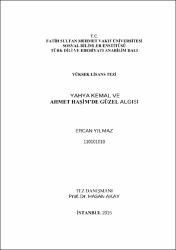Yahya Kemal ve Ahmet Haşim’de Güzel Algısı
Künye
YILMAZ, Ercan, Yahya Kemal ve Ahmet Haşim’de Güzel Algısı, Fatih Sultan Mehmet Vakıf Üniversitesi Sosyal Bilimler Enstitüsü Türk Dili ve Edebiyatı Anabilim Dalı, Yayımlanmamış Yüksek Lisans Tezi, İstanbul 2015Özet
Modern Türk şiirinin iki kurucu şairi Yahya Kemal Beyatlı ve Ahmet
Haşim’le birlikte Türk şiir geleneği birçok bakımdan bir dönüşüme ve değişime
uğramıştır. Bu süreçte şairin dünya tasavvurunda ve eşya algısında belirgin bir
farklılaşma söz konusu olmuştur. Yahya Kemal’de Türk şiir geleneğinin büyük
birikimi yeniden üretilmiş şekilde karşımıza çıkarken Ahmet Haşim’de daha ziyade
bireysel bir durum söz konusudur. Yahya Kemal’de güzel ve güzellik kavramları
tarihle ilişkili olduğu ölçüde olumlu imalara sahipken, Ahmet Haşim ‘hâl’in şairi
olarak dünyayı adeta teniyle kavrayan bir şair kimliğiyle karşımıza çıkar. Yahya
Kemal’de güzel ve güzellik, medeniyet perspektifinde deyiş yerindeyse bir ‘saltanat
istiaresi’ bağlamında ele alınır, Haşim’de ise otobiyografik özellikler daha ön
plandadır ve adeta ‘güzellik semptomları’ ile inşa edilen bir şiir söz konusudur. Her
iki şairde de güzel ve güzellik algısı sadece dünyaya, nesnelere ya da insanlara
bakışla sınırlı değildir. Metnin yani şiirin kendisi bizatihi güzel ve güzellik algısının
somutlaşmış şeklidir. Turkish poetry tradition has been transformed and altered in many ways by
Yahya Kemal Beyatlı and Ahmet Haşim who are the fathers of Modern Turkish
poetry. In this process, there has been a significant difference in the mundane
imagination and object perception of the poet. In Yahya Kemal’s poetry, we can see
the great experience of Turkish poetry tradition reproduced while in Ahmet Haşim’s
poetry, it is rather an individual case. In Yahya Kemal’s poetry, the concepts of the
beautiful and beauty have positive implications to the extent that they are related to
history whereas as the poet of the ‘present’, Ahmet Haşim has the identity of a poet
who comprehends the world almost with his skin. In Yahya Kemal’s poetry, the
beautiful and beauty are treated in the context of a ‘royalty metaphor’ so to say in the
perspective of the civilization. On the other hand, in Haşim’s poetry autobiographical
features are more foregrounded and a poem that is constructed with almost ‘beauty
symptoms’ is in question. In both poets’ poetry, perception of the beautiful and
beauty is not retricted with the look to the world, objects or people. The text, in other
words the poem itself is the concretization of the perception of the beautiful and
beauty.



















